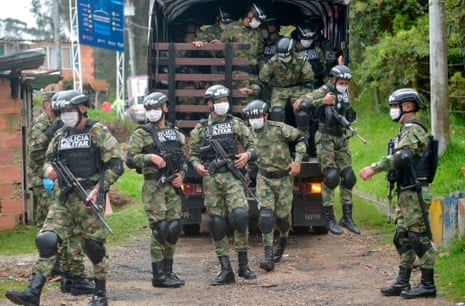Outrage has been sparked in Colombia after a 13-year-old girl was gang-raped by seven soldiers from the country’s army last weekend.
On Thursday, seven soldiers confessed to raping the child from the indigenous Emberá tribe, who went missing from her rural reserve in northern Colombia on Sunday. She was found the next day at a nearby school. News of the horrific crime shocked much of the South American nation, which has long reckoned with violence against indigenous women and girls.
“We know that this is not an isolated issue, it is structural,” said Aida Quilcue, a human rights adviser at the National Indigenous Organization of Colombia (ONIC), at a press conference on Wednesday, when news that authorities were investigating the rape broke. “I want to repudiate this atrocious fact that goes against the rights of women and of the indigenous peoples of Colombia.”
As the fallout continued on Thursday, some were reminded of a similarly brutal act of sexual violence. In 2016, Yuliana Samboní, a seven-year-old indigenous girl, was raped and murdered in Bogotá by Rafael Uribe Noguera, a wealthy architect.
“There is a line that can be drawn through every act of violence against women, whether committed by a soldier, a police officer, a rich man or otherwise: and that line is the abuse of power to deny a woman the right to her own body,” said Olga Amparo Sánchez, director of Casa de la Mujer, a Bogotá-based women’s rights organisation. “The fundamental issue is that a woman’s life has no value in this country.”
The seven soldiers accepted the charge of “unlawful sexual abuse of a minor under 14 years old”, the age of consent in Colombia. The country’s attorney general, Francisco Barbosa, said that the men could receive a sentence of between 16 and 30 years in prison.
Colombia’s vice-president, Marta Lucía Ramírez, called for a speedy judicial process on Thursday. “Colombia must be merciless with sexual abusers of minors, adolescents and women,” the country’s first female vice-president tweeted. “Ou:Pr solidarity with the girl and her family.”
The Emberá community, to which the girl belongs, had previously requested that the perpetrators be subject to their own laws, which Colombia’s constitution grants to autonomous indigenous reserves. Colombia is home to about 2 million indigenous people from 115 different groups.
Some observers say that the horrific episode reveals systemic cruelty within the military. “It’s something systematic, and if their security training and doctrine doesn’t change and doesn’t include a serious human rights component, we can expect to see crimes like this becoming normalised,” said Mafe Carrascal, a Bogotá-based activist.
Others see an alarming pattern of violence against women, particularly during the nationwide lockdown against the coronavirus pandemic that began on 20 March. Colombia has seen 110 femicides this year, with 50 during lockdown.
Campaigners hope that this case could finally shift the discussion towards societal change.
“We’ve been in the streets, shouting ni una más [not one more] for years,” said Yamile Roncancio, director of the Femicide Foundation Colombia, in reference to a common chant to end violence against women in Latin America. “I’m not expecting a change tomorrow, but I am hopeful that we can now have a society-wide conversation that leads to serious change.”
This piece was edited on 26 June 2020 to correct the age of the rape victim
